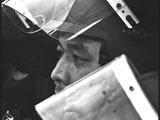Textual healing in Thailand
By Simon Roughneen for ISN
It was not quite heard through the grapevine, to paraphrase another Marvin Gaye hit, but last week Thais were exhorted en masse to help their embattled new prime minister end the country's three-year political crisis.
Recently installed Abhisit Vejjajiva sent a mass SMS to Thais asking them to help him resolve the ongoing stalemate, with the caveat that interested recipients needed to reply with their postal code, at the cost of 3 baht (US$.08). Those that did received a faux-Orwellian message saying: "I am Abhisit Vejjajiva. Thank you very much, and I will get back to you."
The gambit prompted an angry reaction from some Thais, and from consumer rights groups, which deemed the unsolicited message a breach of privacy. The prime minister's Democrat Party (DP) said that he wanted to assess responses from recipients, with the postal code reply giving the government a clearer idea about which parts of the country were amenable to government reconciliation efforts.
Given the well-documented regional and class divisions that underwrite the red-yellow divide in Thailand, perhaps the prime minister was begging the question somewhat.
The new prime minister is backed by the yellow-clad People's Alliance for Democracy (PAD) protesters that had occupied Bangkok's parliament building since last August, and then Thailand's two main international airports from 25 November to 7 December.
Wearing royalist colors in a country that retains a fond allegiance to its monarchy, and that has possibly the world's most draconian lèse-majesté laws, PAD represents some regions in the Thai south - if not the four violent Malay-Muslim provinces in rebellion against Bangkok since 2004 - and is an urban, middle-class movement. PAD seeks to purge politics of what it feels is a corrupt populism - personified by former prime minister Thaksin Shinawatra, who was himself formally ousted in a 2006 coup, but remains popular at the grassroots and influential behind the scenes.
In any case, whatever furor stems from the text message mess might matter little in comparison to what Thailand faces down the line in 2009. Abhisit said as much in his inaugural speech to parliament on 30 December:
"Political conflicts that have spread to civic groups could push the economy, along with the tourism industry, into recession if action is not taken quickly to resolve them and revive confidence among investors and foreign tourists."
The recently deposed administration might take some umbrage at these words, given that the DP was defeated in the last elections held in 2007. Abhisit acceded to the premiership in December, after the Thai judiciary banned incumbent Somchai Wongsawat from politics for five years, and proscribed the Peoples Power Party (PPP) he led (itself a successor to Thaksin's old Thai Rak Thai party). The judiciary found the party guilty of vote buying, along with its two coalition government partners. Abhisit then persuaded enough members of the governing coalition to back the Democrat Party, enabling him to form a successor administration.
Thailand has been labeled one of Asia's more stable polities and investment-friendly economies, even though there have been 15 coups during King Bhumibol's 62-year reign. The circle seems unbroken: Since Abhisit's accession, pro-Thaksin protesters have taken to the streets, initially preventing the new prime minister from making his maiden speech at the parliament building last week. The address was only delivered after a detour to the Foreign Ministry.
These protesters have vowed to emulate PAD tactics from 2006 and of recent months, until new elections are held, presumably with the participation of Thaksin Shinawatra. Abhisit said Thaksin could return, but only if he adhered to decisions taken by the judiciary.
Divisions in the country are clear and growing. PAD seeks a partially nominated legislature, prompting widespread condemnation for its anti-democratic credo. Pro-Thaksin northerners and country people feel that the inaptly named protesters seek to disenfranchise them. Under Thaksin and his successor parties, hitherto marginalized rural groups are described as having received unprecedented benefits. PAD believes this to be pork-barrel hick politics, with beneficiaries bought off with tawdry welfare and infrastructure projects, leaving politicians free to indulge their graft-addled whims.
However, given that PAD, the Thai army, the judiciary - and some say even the monarchy - have conspired to bring down the Thaksinites and re-direct politics back toward a traditional-elitist paradigm, whatever bacon Thaksin and his cronies were able to bring back to the northern marches seems unimportant in comparison.
But the bacon may have to be rationed soon enough, as Thailand's hamstring political system will struggle to deal with the global economic downturn. The country relies on exports and tourism, for 70 percent of its national income. The economy is being squeezed by the twin threats of the global slowdown, which has slashed demands for its main exports, and the damage done to investor confidence by recent political unrest.
The Bank of Thailand painted a bleak economic picture on Tuesday last week, reporting a nearly 18 percent fall in exports in November, the first decline since March 2002, and a slump in manufacturing. The Finance Ministry lowered its 2009 economic growth forecast to 0 percent to 2 percent, from its earlier target of a 4 percent GDP growth.
Abhisit said during his Foreign Ministry speech that "These conflicts are the country's weakness, especially at a time the world economy is entering its worst crisis in a century."
However, it seems unlikely that a prime minister seen as partial to one side of the conflict can overcome divisions, no matter how many text messages he sends. As his opponents bristle for a fight, and the vulnerable Thai economy flounders, Thailand's political grapevine will surely buzz prolifically, and controversially, during 2009.

